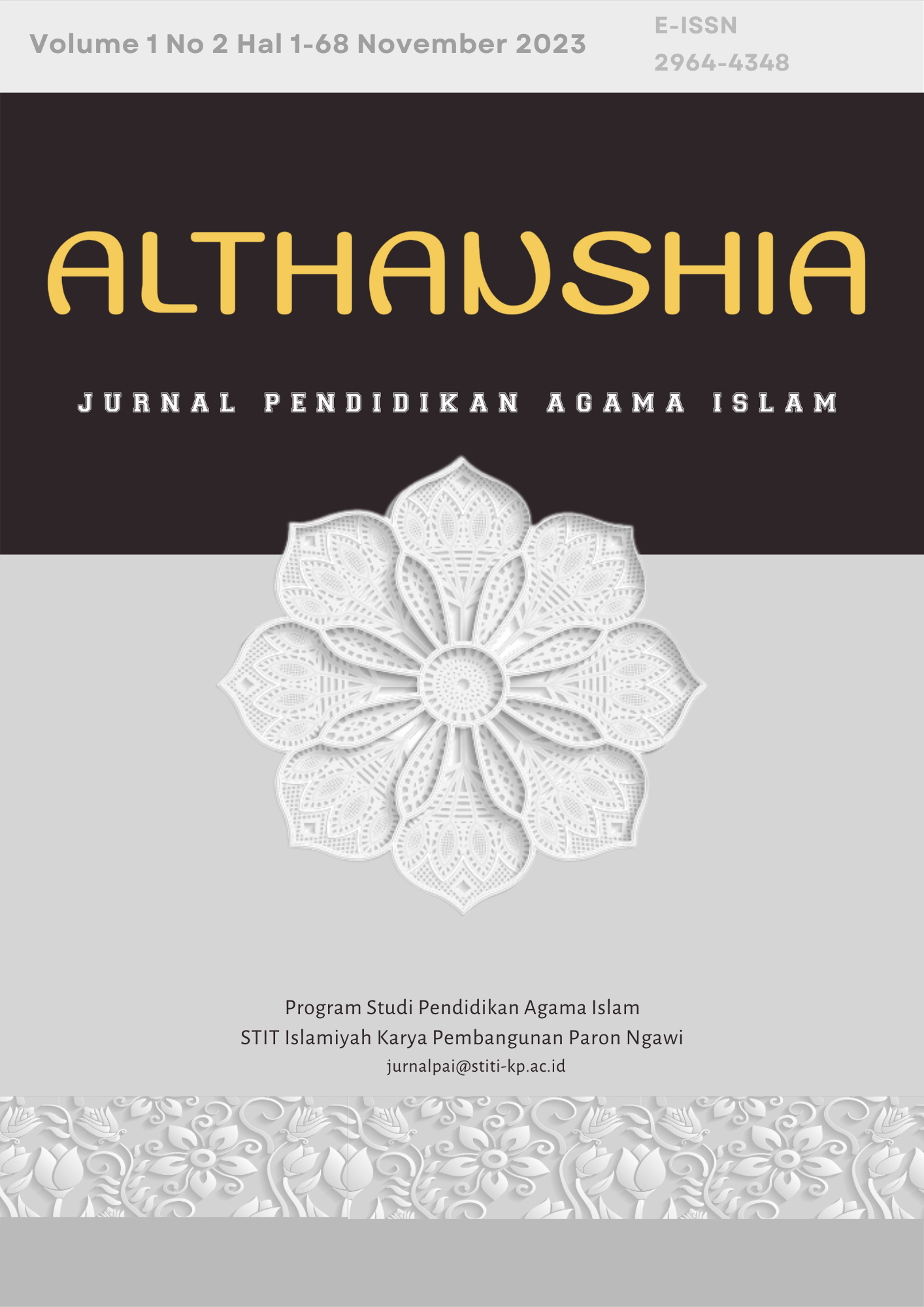INTERNALISASI AKHLAK JUJUR MELALUI KEGIATAN BERCERITA KISAH NABI PADA ANAK
Abstrak
Abstract : The story of the prophet contains the value of honesty which can be used as a medium for internalizing honest morals in children in a family. Storytelling activities attract a lot of children's attention in learning because they are considered to involve more of the child's emotional side. This research was conducted to determine the internalization process, supporting and inhibiting factors, as well as the implementation of internalization of honest morals through the activity of telling stories about the prophet to children. The research is a case study, with data analysis techniques through data reduction, data presentation and verification. Data validity uses triangulation techniques by comparing the results of observations, interviews and documentation. The research results show that the process of internalizing honest morals through the activity of telling stories about the prophet to children is carried out in the preparation stage, the process of telling stories and asking questions using the main medium of books. Support from the family environment, long-standing storytelling habits, and moral strengthening from school are supporting factors for the internalization of honest morals in children. Meanwhile, inhibiting factors include a lack of desire to listen to stories, fear of being scolded by parents, busy parents and circle of friends. The implementation of the internalization of honest morals through the activity of telling stories about the Prophet to children is taking place both at the responding and valuing stages, and has not yet reached the organizing and characterization stages. This indicates the need for continuous assistance and efforts to internalize honesty in children through providing examples from parents and maintaining a social environment that is in accordance with the value of honesty.
Referensi
Badan Pusat Statistik. Profil Anak Usia Dini 2020. Badan Pusat Statistik.
Carol, Cooper, Halsey Claire, Laurent Su, dan sullivan Karen. Ensiklopedi Perkembangan Anak (Ter: Your Child Year by Year). Erlangga, 2008.
Dewi, Vemmi Kesuma. Keajaiban Dongeng Teori Dan Praktek Mendongeng. Surabaya: Cipta Media Nusantara (CMN), 2021.
Feist, Jess, dan Gregory J. Feist. THEORIES OF PERSONALITY, Terj. Yudi Santoso. Yogyakarta: Pustaka Pelajar, 2008.
Fitrianti, Fitrianti, dan Delfi Eliza. “Peningkatan Karakter Moral Anak Usia 5-6 Tahun Melalui Cerita Nabi Ibrahim Di Taman Kanak-Kanak Harapan Ibu Kabupaten Pasaman Barat.†Inovtech 1, no. 02 (9 Desember 2019). http://inovtech.ppj.unp.ac.id/index.php/inovtech/article/view/83.
Hurlock, Elizabeth B. Perkembangan Anak Jilid 2 Edisi Keenam. Jakarta: Erlangga, 2013.
Katoningsih, Sri. Keterampilan Bercerita. Surakarta: Muhammadiyah University Press, 2021.
Komisi Penyiaran Indonesia. Hasil Riset Indeks Kualitas Program Siaran TV Periode II Tahun 2019.
Mahmud Al-Mishri Abu Amar. Hiduplah Bersama Orang-Orang Jujur : Langkah Mudah Menikmati Hidup Penuh Berkah. Pustaka Arafah, 2008.
Nugroho, M. Yusuf Amin. Tertawa Bersama Siswa: Seni Merancang Pembelajaran yang Rileks dan Gembira. Bimalukar Kreativa, 2020.
Purba, Hadis, Raisah Armayanti Nasution, dan Rosita Rosita. “Metode Bercerita Kisah Nabi dan Pengaruhnya Terhadap Perkembangan Akhlak Anak di RA Hamdaniyah.†JURNAL RAUDHAH 9, no. 1 (8 Maret 2021). https://doi.org/10.30829/raudhah.v9i1.942.
Puspitasari, Nur Aini, Syarif Hidayatullah, dan Abdul Rahman Jupri. Keterampilan Mendongeng. 1 ed. jakarta Selatan: Pustaka Ranggon, 2018.
Zubaedi. Desain Pendidikan Karakter. Prenada Media, 2015.
- Pdf (English)
- pola-terbaru-dengan-teknik-analisis.html (English)
- trik-jackpot-cepat-dengan-langkah-langkah.html (English)
- trik-jackpot-edisi-terbaru-hari-ini.html (English)
- trik-jackpot-update-langkah.html (English)
- tutorial-rtp-live-dengan-example (English)
- volume-baru-kombinasi-gacor-kingmaker.html (English)
- cara-setting-pola-cepat-gacor-dengan-langkah-jelas.html (English)
- analisa-jam-emas-dan-pola-mahjong-ways-agar-stabil-dan-unggul.html (English)
- cara-memahami-rtp-dan-pola-mahjong-ways-3-terupdate.html (English)
- cara-memanfaatkan-pola-gacor-mahjong-ways-dengan-teknik-terupdate.html (English)
- rahasia-komplet-pola-gacor-mahjong-ways-dan-rtp-terupdate.html (English)
- rahasia-pola-mahjong-ways-dan-jadwal-gacor-hari-ini.html (English)
- metode-startergi-maxwin-cepat-rtp-valid-terpercaya.html (English)
- mahjong-ways-strategi-gacor-digital-rtp-jam-pola.html (English)
- gacor-mahjong-ways-digital-strategi-jam-pola-rtp.html (English)
- pola-mahjong-ways-yang-bikin-banyak-orang-kaget-saat-diuji.html (English)
- trik-pola-gacor-mahjong-ways-anti-loss.html (English)
- rtp-mahjong-ways-dan-peta-pola-gacor.html (English)
- rtp-mahjong-ways-pusat-pola-gacor.html (English)
- sinyal-rtp-mahjong-ways-menuju-pola-gacor.html (English)
- sumber-kemunculan-pola-gacor-mahjong-ways-dari-rtp.html (English)
- pola-bertahap-dan-rtp-berwawasan-membentuk-alur-menang-kompleks-pada-pragmatic.html (English)
- analisis-rtp-teknik-live-harian-panduan.html (English)
- pola-rtp-mahjong-ways-digital-strategi-gacor.html (English)
- alur-tersembunyi-mahjong-ways-yang-sering-muncul-tanpa-disadari.html (English)
- kalkulasi-rinci-pola-rtp-dan-oriented-strategy-yang-menghasilkan-menang-di-pragmatic.html (English)
- bocoran-pola-gacor-malam-ini-anti-zonk.html (English)
- pola-rtp-hari-ini-untuk-kinerja-digital-menang-otomatisasi.html (English)
- update-pola-digital-dan-rtp-terintegrasi-hari-ini-untuk-menang-ritme-kerja.html (English)
- panduan-pola-digital-habanero-pgsoft-gacor-dengan-trik-tajam-teruji.html (English)
- langkah-gacor-update-pragmatic-play-terkini.html (English)
- highlight-pola-permainan-pg-soft-berdasarkan-review-komunitas.html (English)
- insight-tentang-perubahan-pola-fitur-pada-pragmatic-play.html (English)
- menelusuri-pola-kombinasi-wild-dan-scatter-pada-game-pg-soft.html (English)
- narasi-tren-game-pragmatic-play-berdasarkan-preferensi-global.html (English)




 Indeks similarity 30% maximum (exclude bibliography)
Indeks similarity 30% maximum (exclude bibliography)

